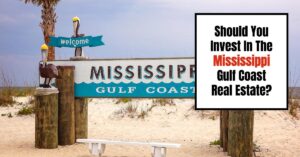If you're contemplating the idea of investing in real estate, you might be asking yourself, “Should you invest in the Mississippi Gulf Coast real estate?” The answer leans toward a resounding yes, as recent market trends and regional growth projections demonstrate a promising future. The Mississippi Gulf Coast is not only a haven for beach lovers but also a burgeoning opportunity for savvy investors looking to capitalize on a thriving real estate scene.
Should You Invest in the Mississippi Gulf Coast Real Estate? Trends & Opportunities
Key Takeaways
- Steady Growth: The Mississippi Gulf Coast real estate market shows a consistent upward trend, particularly notable in Gulfport and Biloxi.
- Affordability: The median home price in Gulfport has risen to about $234,913, reflecting a 2.2% increase compared to last year.
- Increasing Demand for Rentals: As tourism grows, so does the market for vacation rentals, making it lucrative for investment.
- Diverse Property Options: From luxury beachfront homes to affordable condos, the region offers a wide array of real estate investments.
- Supportive Local Government: Initiatives at the municipal level are favorable for growth in the real estate sector.
Current Market Statistics for 2024
As of July 2024, the Mississippi Gulf Coast is experiencing significant growth in its real estate sector. According to a report from Rocket Homes, the median home price in Gulfport has increased to $234,913, marking a 2.2% rise from the previous year. This increase reflects the growing interest from both local buyers and those relocating from other regions, particularly following the COVID-19 pandemic, which prompted many to seek out more spacious living arrangements in desirable locales.
Additionally, the demand for real estate in Biloxi continues to climb, driven largely by the influx of tourists. A report by the Biloxi Sun Herald highlights how towns like Ocean Springs, Bay St. Louis, Gulfport, and Biloxi have seen prices rise as out-of-state buyers move to the area, taking advantage of its affordability and lifestyle offerings.
The Rise and Economic Growth of the Mississippi Gulf Coast Region
The Mississippi Gulf Coast has undergone a remarkable transformation over the past few decades, evolving from a region primarily known for its fishing and agriculture into a vibrant hub bustling with economic activity. This metamorphosis is the result of several factors, including strategic investments, infrastructural developments, and a focus on tourism, which have collectively contributed to its rise as one of the most desirable areas to live and invest in along the Gulf Coast.
Historical Context
Historically, the Mississippi Gulf Coast has been a region defined by its natural resources. Fishing and the agricultural industry formed the backbone of the local economy. However, the area faced significant challenges in the early 2000s, most notably with the devastation wrought by Hurricane Katrina in 2005. This catastrophic event, while tragic, became a turning point for the region. The destruction necessitated a comprehensive rebuilding effort, which paved the way for new economic ventures and infrastructural improvements.
Tourism and Hospitality Boom
One of the critical drivers of economic growth in the Mississippi Gulf Coast has been the surge in the tourism and hospitality sector. With its beautiful beaches, rich cultural heritage, and a plethora of recreational activities, the region has become a favorite destination for travelers from across the United States and beyond.
Key Attractions
- Casinos: The proximity to water and favorable state laws make the Mississippi Gulf Coast an attractive location for casinos, which have played a significant role in driving tourism. Major locations in Biloxi and Gulfport feature expansive resorts and casinos, offering entertainment and hospitality, drawing millions of visitors annually.
- Beaches and Nature: The region's natural beauty is further accentuated by its stunning coastline, parks, and nature reserves. Beaches like those in Ocean Springs and Biloxi attract audiences for water sports, fishing, and sunbathing. Eco-tourism has also gained traction, inviting visitors to explore the local biodiversity and natural landscapes.
- Cultural Events: Annual events and festivals, like the Biloxi Seafood Festival and the Great Mississippi River Balloon Race, celebrate local culture and cuisine, further solidifying the area’s reputation as a vibrant community.
Infrastructure Development
The economic rejuvenation of the Mississippi Gulf Coast has also been supported by significant investments in infrastructure. Key highways have been improved, expanding accessibility to the region, while local airports have grown to accommodate increasing travel demands. Furthermore, investments in public amenities, such as parks and recreational facilities, have made the area more attractive to both residents and tourists.
Real Estate Development
With rising tourism came the need for more housing and commercial spaces, leading to a boom in real estate development. New condominium complexes, vacation homes, and rental properties have been established to meet the demand, creating additional job opportunities in construction and property management.
Diversification of Economic Activities
While tourism is a significant part of the economy, the Mississippi Gulf Coast is diversifying its economic base to reduce reliance on seasonal visitors. Health care, education, and marine technology have emerged as other critical sectors.
- Healthcare: The region is home to several major hospitals and medical facilities that not only serve local residents but also attract patients from other regions. This growing sector provides ample employment opportunities and contributes to the overall economy.
- Education: Institutions like the University of Southern Mississippi offer higher education opportunities that attract students and contribute to the area’s workforce.
- Marine Technology and Fisheries: Investments in marine technology have seen the area capitalize on its fishing heritage while also innovating new approaches to sustainability and fisheries management.
Government and Community Initiatives
The local government has played a crucial role in driving economic growth through various initiatives aimed at stimulating investment and attracting new businesses. Incentives for start-up companies, grants for further education, and training programs to improve workforce skills are part of a broader strategy to foster a thriving economic environment.
Community engagement has also contributed to the region's rise. Local organizations and chambers of commerce have promoted the importance of supporting small businesses, and this focus on fostering home-grown enterprises has led to a more resilient and diverse economy.
Top Reasons to Invest in Mississippi Gulf Coast Real Estate
- Robust Tourism Sector: The thriving tourism industry is a major driver of demand for rental properties, offering lucrative opportunities for investors.
- Cost-Effectiveness: The affordability of real estate in comparison to other coastal regions makes it an attractive investment for first-time buyers and seasoned investors alike.
- Diverse Investment Opportunities: The variety of properties available—ranging from luxury homes to affordable condos—caters to different investment strategies and risk appetites.
- Stable Rental Market: The growing demand for both short-term and long-term rentals indicates a robust rental market, essential for generating consistent cash flow.
- Quality of Life and Community: The region offers a high quality of life with its beautiful natural surroundings, recreational opportunities, and community-focused events, attracting new residents.
- Supportive Government Initiatives: Local government initiatives aimed at economic growth and investment provide an additional layer of security and potential return on investment.
Current Challenges
While the outlook is positive, potential investors should be aware of challenges such as natural disaster risks, given the region’s vulnerability to hurricanes and flooding. Furthermore, rising insurance costs could impact the overall investment returns.
Real estate markets are inherently cyclical, and while trends are favorable now, they can shift. Therefore, conducting thorough research and remaining informed about market conditions is essential for any investor.
Future Outlook
The future of the Mississippi Gulf Coast looks promising. Demographic trends suggest growing interest from younger generations seeking both investment opportunities and a quality lifestyle. As more remote workers seek coastal locations, the demand for housing and commercial properties is expected to increase.
Additionally, ongoing infrastructure improvements and a proactive approach to strategic planning and investment will continue to enhance the area’s appeal. The broadening of industries, coupled with a focus on tourism and hospitality, suggests that the economic growth seen in the region will continue.
Conclusion
The Mississippi Gulf Coast, once primarily known for its natural resources and modest tourism, now stands as a testament to resilience and innovation. Its rise from the aftermath of Hurricane Katrina to a bustling economic center is not just inspiring but a blueprint for sustainable growth.
A combination of historical richness, diverse attractions, and comprehensive development initiatives has paved the way for a vibrant future. For investors, the ongoing economic growth indicates that the Mississippi Gulf Coast real estate market offers promising opportunities while contributing to the region's continued evolution and success.


 You do not need a degree in economics to become market-literate, just an understanding of how local real estate economies work, fluency with the terminology, and good sources for local data on sales, prices, values, and inventories. Add your professional expertise and your skilled observations of the latest trends in the charts and numbers and you have a winning formula.
You do not need a degree in economics to become market-literate, just an understanding of how local real estate economies work, fluency with the terminology, and good sources for local data on sales, prices, values, and inventories. Add your professional expertise and your skilled observations of the latest trends in the charts and numbers and you have a winning formula.
 For a good number of real estate professionals, 2012 wasn't a great year. We were still on a downward spiral towards the bottom of the real estate market. This wasn't exciting news for real estate investors looking to make profitable deals
For a good number of real estate professionals, 2012 wasn't a great year. We were still on a downward spiral towards the bottom of the real estate market. This wasn't exciting news for real estate investors looking to make profitable deals  The National Association of Realtors said on Thursday what home buyers and real estate investors in many parts of the United States have known for months: it’s becoming a seller’s market.
The National Association of Realtors said on Thursday what home buyers and real estate investors in many parts of the United States have known for months: it’s becoming a seller’s market.